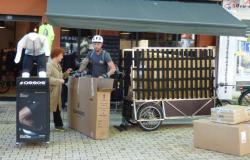
”I hardly have any clients anymore apart from La Ruche qui dit Oui, with whom I collaborate every Thursday”, admits Stéphane Vanbraband. A retired architect for a few months, the Mouscronnois is continuing “Pignon sur Rue”, his bicycle delivery service that he founded in 2018. His activity has had some great partnerships in recent years (De Ranke, Storme, For&Ver cinema) but today, it’s a gloomy plain and a headwind.
Would headwinds blow stronger in Mouscron than elsewhere? “In Brussels, Ghent or Liège, couriers have work. Bicycle deliveries work well. Even in Deinze, in a town of almost similar size, the concept works. I have the impression that Mouscron is on a potato hunt. The car still occupies a very important place on our roads. Its impact is quite heavy on traffic.” An observation from an experienced delivery person, but also from a member of GRACQ (Research and Action Group of Daily Cyclists), who has several times pointed out the inconsistencies of the shouted cycle lanes. “When I started delivering by bike, several clients approached me because they had this concept of leaving the car behind in their DNA. I hoped for a while that Pignon sur Rue would develop. When I started, I was new to cycle logistics, but I have been riding a bike since the early 2000s.”
Stéphane has seen cycling policy evolve. In 2024, cycling will have a little more space on public roads. To adapt to the cargo bike, you still have to wait. “I use the term potato hunt because the City of Mouscron was late. A delay that she is trying to make up for. It has the cycle label and improvements are being made, but it has other levers to speed up the process. Adapting the network to classic bicycles and family use can go hand in hand with provision for cargo bikes. These bicycles, for example, have more difficulty passing chicanes”, explains the Mouscronnois.
“A 25 kg cargo bike can carry a load of 100 kg”
Stéphane Vanbraband examined the latest Municipal Mobility Plan, in which GRACQ participated. One sentence caught his full attention. The one which stipulates that the City of Mouscron wants “open up reflection on the possibility of guiding freight transport towards sustainable transport.“The place of the bicycle also requires awareness. “25% of deliveries can be made with a cargo bike. A bicycle like mine weighs 25 kg and can carry up to 100 kg, four times its weight. I even know moving companies that use bicycles.”
As for those who talk about the inner circle of big cities, Deinze is the perfect counterexample. A model to be copied in Wallonia from now on. As for the future of Pignon sur Rue, the Mouscronnois confides relative discouragement. “I am 64 years old, I recently retired. I am continuing deliveries for the moment, but not for years. In fact, I persist out of passion and to show that the cargo bike exists and that it is a viable alternative. There is a bit of disappointment to see that this delivery method has not developed further, but nothing is set in stone. The more we put constraints on the use of cars and trucks and vans for deliveries in the urban fabric, the more we will turn to cycle logistics. Especially since conventional transport continues to lose efficiency. I continue to believe in it and hope that future generations will take cargo bikes and bicycle delivery more seriously.” So that the tide turns and is behind the practice that Stéphane launched in Mouscron, six years ago.





